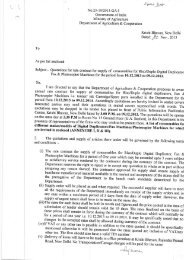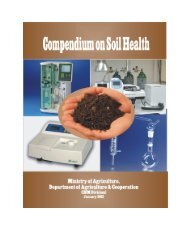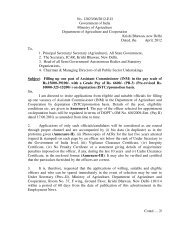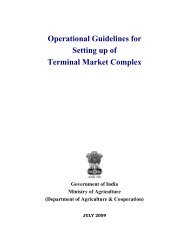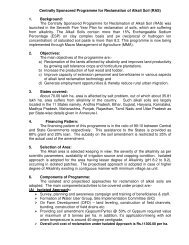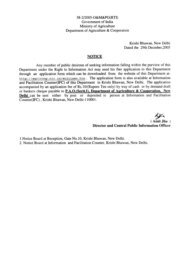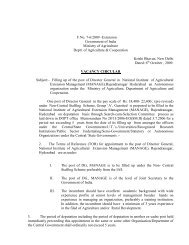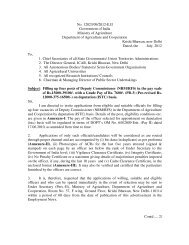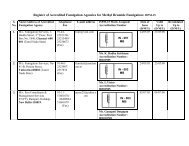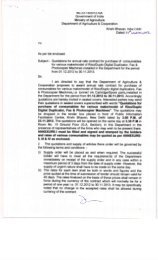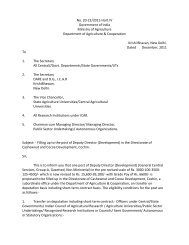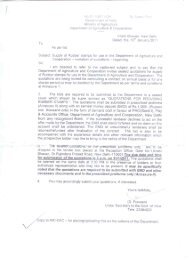Annual Report 2009-2010 - Department of Agriculture & Co-operation
Annual Report 2009-2010 - Department of Agriculture & Co-operation
Annual Report 2009-2010 - Department of Agriculture & Co-operation
Create successful ePaper yourself
Turn your PDF publications into a flip-book with our unique Google optimized e-Paper software.
7.3 During <strong>2009</strong>-10 (up-to December <strong>2009</strong>),<br />
Pest Risk Analyses (PRA) for the import <strong>of</strong> 96<br />
items were completed, and technical information<br />
provided for the export <strong>of</strong> 15 items to the<br />
concerned National Plant Protection<br />
Organisations. First, second, third, and fourth<br />
amendments to the Plant Quarantine (Regulation<br />
<strong>of</strong> Import into India) Order, 2003 were notified in<br />
the Gazette <strong>of</strong> India after finalisation while the<br />
draft fifth, sixth, seventh, and eighth<br />
amendments were notified to the World Trade<br />
Organization for inviting the comments <strong>of</strong><br />
member countries. The screening <strong>of</strong> 1,502 lakh<br />
metric tonnes <strong>of</strong> imported agricultural<br />
commodities was undertaken and 11,144 import<br />
permits were issued. Phytosanitary inspections<br />
for the export <strong>of</strong> 101 lakh metric tonnes <strong>of</strong> plants<br />
and plant material were conducted and 59,679<br />
PSCs were issued. There were 121 pest control<br />
agencies accredited for undertaking fumigation<br />
as on 31 December <strong>2009</strong>, including 16 new<br />
accredited agencies. There were 60 agencies<br />
accredited for Forced Hot Air Treatment (FHAT)<br />
for wood and wood packaging material, including<br />
20 new accredited agencies.<br />
7.4 To improve quarantine services by<br />
bringing in greater transparency and efficient<br />
dissemination <strong>of</strong> information as well as to<br />
facilitate an electronic data interface with<br />
Customs, a web-based Plant Quarantine<br />
Information System (PQIS) is being implemented<br />
through the National Informatics Centre, New<br />
Delhi.<br />
7.5 India hosted the 26th Session <strong>of</strong> the Asia<br />
and Pacific Plant Protection <strong>Co</strong>mmission (APPPC)<br />
at New Delhi from 31 August to 4 September<br />
<strong>2009</strong>.<br />
7.6 Integrated Pest Management: Integrated<br />
Pest Management (IPM) is an eco-friendly<br />
approach, which aims at keeping pests below<br />
the economic threshold level (ETL) by employing<br />
all available pest control methods and techniques<br />
such as cultural, mechanical, and biological<br />
control, with greater emphasis on the use <strong>of</strong> biopesticides<br />
and pesticides <strong>of</strong> plant-origin such as<br />
Neem formulations. The use <strong>of</strong> chemical<br />
pesticides is advised as a last resort, when pests<br />
cross the ETL. IPM related activities are being<br />
implemented through 31 Central Integrated Pest<br />
Management Centres (CIPMCs) established in<br />
28 States and one UT. These activities are funded<br />
under the central sector plan scheme, the<br />
Strengthening and Modernisation <strong>of</strong> Pest<br />
Management Approach (SMPMA).<br />
7.7 IPM activities are propagated through<br />
Farmers' Field Schools (FFSs). This is a form <strong>of</strong><br />
adult education evolved from the concept that<br />
farmers learn optimally from field observations<br />
and experimentation. FFSs are organised to help<br />
farmers tailor IPM practices to suit their needs.<br />
These schools are conducted separately for the<br />
Kharif and Rabi seasons, each FFS lasting 14<br />
weeks. During <strong>2009</strong>-10 (up-to December <strong>2009</strong>),<br />
576 FFSs were conducted by CIPMCs in which<br />
15,069 farmers and 2,498 <strong>Agriculture</strong> Extension<br />
Officers (AEOs) were trained.<br />
7.8 Apart from conducting FFSs, the CIPMCs<br />
carry out pest/disease monitoring and<br />
conservation, production, and release <strong>of</strong> biocontrol<br />
agents. A total <strong>of</strong> 124 crore bio-control<br />
agents were mass produced in the laboratories<br />
and released against insect and pests in various<br />
crops covering an area <strong>of</strong> 0.52 lakh hectares (upto<br />
December <strong>2009</strong>).<br />
7.9 Seed Treatment Campaign: Seed<br />
treatment is the use and application <strong>of</strong> chemical<br />
and biological agents on seeds to control primary<br />
soil and seed borne infestation <strong>of</strong> insects and<br />
diseases, which are serious threats to crop<br />
production. Since 1997, the seed treatment<br />
campaign is taken up every year by the<br />
<strong>Department</strong> <strong>of</strong> <strong>Agriculture</strong> and <strong>Co</strong><strong>operation</strong><br />
Plant Protection<br />
41



